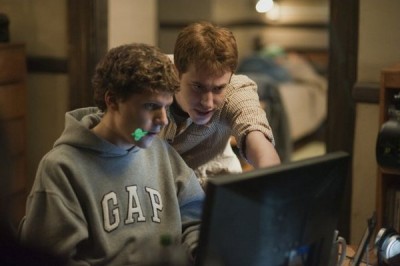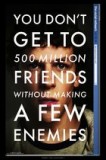| Reviews & Columns |
|
Reviews DVD TV on DVD Blu-ray 4K UHD International DVDs In Theaters Reviews by Studio Video Games Features Collector Series DVDs Easter Egg Database Interviews DVD Talk Radio Feature Articles Columns Anime Talk DVD Savant Horror DVDs The M.O.D. Squad Art House HD Talk Silent DVD
|
DVD Talk Forum |
|
|
| Resources |
|
DVD Price Search Customer Service #'s RCE Info Links |
|
Columns
|
|
|
Social Network, The

David Fincher's The Social Network is a business procedural played with the intensity of a thriller and the ingenuity of a screwball comedy. It's something of a departure for the filmmaker, whose pictures lean toward visual pyrotechnics and darker, more disturbing themes. Handling a screenplay by Aaron Sorkin that consists primarily of people in rooms talking, and in which the violence is purely psychological, he curbs his occasional excesses and cooks up his most satisfying film to date. Though mining (with some significant departures from the official record) the origin story of Facebook, a presumably of-the-moment phenomenon, Fincher and Sorkin have made a movie that is about more than its ostensible subject. Yes, The Social Network examines, at least implicitly, the cultural moment that precipitates the explosion of a site that aims specifically to make the social experience a virtual construct. But where the film strikes oil is in understanding the kind of guy who would want to create that experience.
His name is Mark Zuckerberg (Jesse Eisenberg), and the opening scene that introduces him is a whiz-bang Sorkin special--a flurry of rat-tat-tat dialogue and cranked-up interplay in which characters talk non-stop while revealing themselves only accidentally. Zuckerberg, a smug Harvard sophomore obsessed with the university social hierarchy that he cannot penetrate, is out with his girlfriend Erica (Rooney Mara); he clearly sees himself as smarter than her (she attends lowly Boston University), but she's so adroit at conversational maneuvers that before he realizes it, she's broken up with him. Depressed and half-drunk, he goes back to his dorm, blogs some hurtful things about her, and concocts a website called "facemash" that pulls pictures from campus sites and lets students rank the women against each other. Fincher gives this embryonic sequence the finesse and energy of an action scene--particularly as he intercuts the rich and powerful "club" kids living the life Mark longs for, the velvety seductiveness of the haves in sharp contrast to the laptop tappings of the have-nots.
The program crashes Harvard's server and gets him called on the university carpet, but it also catches the attention of would-be power broker Divya Narenda (Max Minghella) and irritatingly entitled rich twins Tyler and Cameron Winlevoss (both played by Armie Hammer). The trio approaches Mark with an idea for a new networking site--"The Harvard Connection," a school-wide apparatus for profiles, pictures, and so on. Mark jumps in, but decides almost immediately that he can do this thing better than they can; he builds on the concept, hits up his best friend--and occasional conscience--Eduardo Saverin (Andrew Garfield) for a grand or so in start-up funds, and launches his version, "the facebook."
The complex saga of the rise of Facebook (and of Zuckerberg) is told in interlocking depositions ("I'm currently in the middle of two lawsuits," Mark explains, somewhat impatiently), which sounds like the dullest imaginable framework for a narrative. But the picture gets a kick from Sorkin's distinctive conversational rhythms and considerable skills as a wordsmith. The Social Network is a whirlwind of talk--invigorating, intelligent, fast-paced dialogue, from the throwaway lines to the occasional loquacious show-stopper. Every Sorkin script has one (Nicholson's "You can't handle the truth" bit in A Few Good Men is the obvious example, though Baldwin's "I am God" speech in Malice is nearly as quotable); here, it comes when the Winlevosses' lawyer asks Mark, "Do I have your full attention?," unleashing a perfect storm of Sorkinian attitude, snark, and barely-contained impatience. "You have part of my attention--you have the minimum amount," Mark snaps. "The rest of my attention is back at the offices of Facebook, where my colleagues and I are doing things that no one in this room, including and especially your clients, are intellectually or creatively capable of doing. Did I adequately answer your condescending question?"
Filming a Sorkin script that's about anything more than the words is a tricky business. Even a director as skilled as Mike Nichols (in Charlie Wilson's War) didn't end up doing much more than Sorkin's television collaborators--i.e., pointing the camera while people said good lines, sometimes while walking. David Fincher isn't exactly the first filmmaker you'd think to pair with him, but the shotgun marriage is unexpectedly ideal, with cinematographer Jeff Cronenweth's moody autumnal imagery adding depth, dimension, and a heaping spoonful of melancholy to the narrative. (The ambient score by Trent Reznor and Atticus Ross tensely ratchets up the stakes.) Fincher's fascination with process, which made 2007's brilliant Zodiac so overwhelming, suits this material well. As a former music video director, he also knows how to convey the intoxication of wealth (see his fetishistic videos for "Cradle of Love" and "Freedom '90"), as in the scene where Internet entrepreneur Sean Parker (Justin Timberlake) takes Zuckerberg to a hip, sexy nightclub and talks a good, seductive game.
Performances are universally strong--Garfield (the next Spiderman) is immensely likable and marginally heartbreaking, Hammer's double-playing is simple but effective, and Timberlake, as the well-connected but semi-flaky Parker, handily sells his multi-layered portrait of the guy who knows all the angles but can't quite hide his own rough edges. But Eisenberg's is the breakthrough performance; as good as he's been as shy, stuttering, would-be intellectuals in Adventureland and The Squid and the Whale, this is a darker and more complicated piece of work. His performance here is somehow both showy (particularly those 100 mile-per-hour line readings) and deftly underplayed--you get the sense, from that very first scene, that he's already tired of always being the smartest guy in the room.
When The Social Network was announced, it seemed such an oddball project that snickers and jeers were the prevailing response (wonder if the critics will "like" it, ho ho). But from the unveiling of its mesmerizing trailer a few months back, it was clear that this wasn't just "the Facebook movie," any more than Citizen Kane was a film about newspapers. Some have complained that the picture is not sufficiently of its moment, that it doesn't have enough to say about the "Facebook generation," but Fincher and Sorkin never put that on the menu; they seem more interested in creating a bold, smart, raucously witty origin story, with a bit of Kane-style muckrakery thrown in. Nowhere is that parallelism more clear than in Fincher's perfect closing images, in which Zukerberg's own Rosebud is but a keystroke away, yet as unattainable as ever.
Jason lives in New York. He holds an MA in Cultural Reporting and Criticism from NYU.
|
| Popular Reviews |
| Sponsored Links |
|
|
| Sponsored Links |
|
|
| Release List | Reviews | Shop | Newsletter | Forum | DVD Giveaways | Blu-Ray | Advertise |
|
Copyright 2024 DVDTalk.com All Rights Reserved. Legal Info, Privacy Policy, Terms of Use,
Manage Preferences,
Your Privacy Choices | |||||||










